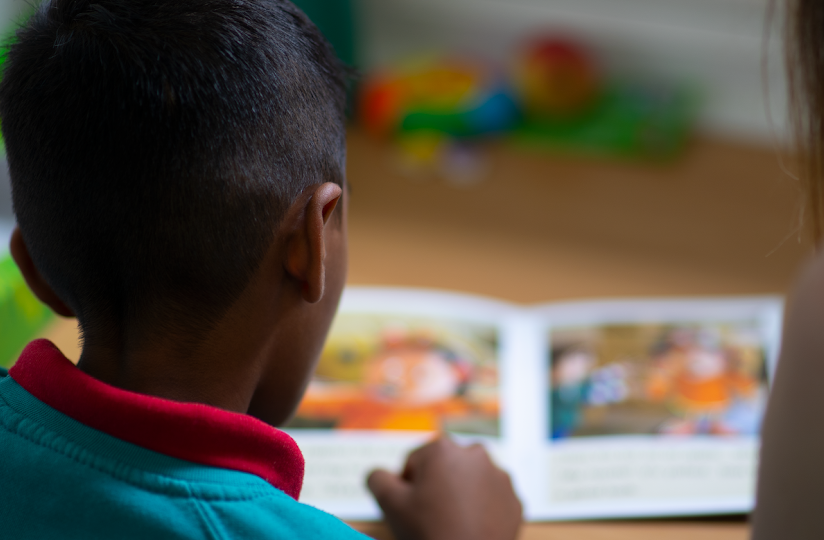
English and Phonics
Intent
'Be the best you can be’ is at the heart of the HPP curriculum. Across the partnership, we pride ourselves on our progressive and vocabulary-rich curriculum being clear, carefully considered and connected. This ensures that our children develop key knowledge and skills in a fun and inspiring way so that they are well-prepared for the next stage of their education. Resilience and independence are embedded through the partnership’s ambitious expectations for all children to succeed, whilst developing a life-long love for learning. By working in partnership with parents and carers, this supports our vision of excellence while considering all pupils’ individual starting points and personal needs.
At Hampton Infant School we believe that a quality English curriculum should instil children with a love of reading, writing and discussion. A high-quality education in English will equip children with the skills to speak, read and write fluently so that they can communicate their ideas and emotions to others, and through their reading and listening, others can communicate with them. One of our main priorities is ensuring children have the skills to decode and develop fluency in reading and develop their comprehension skills. We teach children to make the link between decoding and encoding and recognise the importance of nurturing a culture where children take pride in their writing, can write clearly and accurately and adapt their language and style for a range of contexts. We teach the children to become creative writers who can re-read, edit and improve their own writing, and enable pupils to become confident when using the essential skills of grammar, punctuation and spelling.
We believe that children need to develop a secure knowledge-base in English to support them in all areas of learning. We know that a secure basis in literacy skills is vital to a high-quality education.
The Early Years Foundation Stage curriculum aims to ensure that all pupils:
- are excited and motivated to read, write and express themselves;
- are explicitly taught vocabulary so they have the knowledge and words to be highly effective communicators and are provided with a rich and imaginative curriculum;
- are exposed to a wide variety of high-quality literature;
- build and internalise a bank of stories that support them in developing their imagination, vocabulary, writing techniques and confidence;
- are taught phonics, spelling and grammar that is contextualised within the art of writing;
- are exposed to high-quality shared reading and writing, modelling the skills and techniques of being a confident reader and writer; and
- receive informative and motivational feedback in order to move them on developmentally, as well as motivationally as readers and writers.
The national curriculum for English aims to ensure that all pupils:
- read easily, fluently and with good understanding;
- develop the habit of reading widely and often, for both pleasure and information;
- acquire a wide vocabulary, an understanding of grammar and knowledge of linguistic conventions for reading, writing and spoken language;
- appreciate our rich and varied literary heritage;
- write clearly, accurately and coherently, adapting their language and style in and for a range of contexts, purposes and audiences;
- use discussion in order to learn; they should be able to elaborate and explain clearly their understanding and ideas; and
- are competent in the arts of speaking and listening, making formal presentations, demonstrating to others and participating in debate.
Reading
We recognise that reading is of central importance in allowing children to access learning, broaden their educational experiences and deepen their knowledge of the world. We plan to nurture in each child a love of books and reading and develop a growing ability to read fluently, confidently and with understanding, not only to improve and extend each child’s skills but also for pleasure.
We have created a recommended reading list for each year group. These are books to share with your child and for them to read as they become able.
Phonics
Phonics consists of the skills of segmentation and blending, knowledge of the alphabetic code and understanding of the principles which underpin how children learn to read and spell. The children in EYFS and Year 1 receive daily phonics sessions through supportive, differentiated group work.
In Nursery the children are developing their communication, language and literacy skills over the course of the year in preparation for learning letter sounds. We play a variety of games and activities with the children and music has a key part in developing children’s language. Most are adult-led activities and the way we model speaking and listening, interact and talk with the children is critical to the success of our early phonics activities . We also provide opportunities on a daily basis for child initiated learning where the children can play and explore their new found skills. This plays a very important part in their development. The emphasis is to get children attuned to the sounds around them and ready to begin developing oral blending and segmenting skills.
Reception and Year 1 teachers use progressive planning including principles laid out in the Sounds Write Scheme. Focused activities allow children to revisit, learn, practise and apply their knowledge and understanding through fun and engaging games and activities. Pupils are systematically taught the phonemes (sounds), how to blend the sounds through words for reading, and how to segment the sounds for spelling.
When children reach the summer term of Year 1 their phonic knowledge is assessed through the statutory phonics screening check. It can also be repeated during Year 2 to monitor progress and identify those children in need of intervention.
When children reach Year 2 they will still receive regular phonics sessions, however, these are taught as a whole class. Any children who require additional support will be given precision teaching sessions with an adult in a small group or one to one. This is to ensure these valuable reading and spelling skills are embedded and children are confident moving forward after they finish KS1.
- Phonics Information for Parents 2025
- Phonics skills progression-Autumn
- Phonic skills progression-Spring
- Phonics skills progression-Summer
WRITING
Our children need to develop a passion and skill for writing in which they feel comfortable experimenting with different styles and formats. Our aim is to provide children with opportunities to enjoy writing and to understand the purpose of writing. Children need to want to write to be a successful writer. In Early Years, all children’s attempts at writing, including emergent writing, are valued and built upon, so that children appreciate the importance of their writing in conveying meaning to the reader. In KS1, the emphasis will be on verbally rehearsing writing and this will lead to regular writing sessions. In Year 2, with support and guidance, children are encouraged to edit their work and identify areas of development in their own writing. This enables them to be more reflective learners and develops lifelong skills in writing.
Spellings
Spelling is an integral part of the writing process. Children who spell with ease are able to concentrate on the content of their writing and the making of meaning. The learning of spelling is encouraged as part of the home-school partnership and weekly spellings will be put on the website to practise at home in Year 1 and Year 2. These are then tested through a ‘spelling quiz’. Children can be given words according to their developmental needs, so the amount and level of difficulty will vary.






